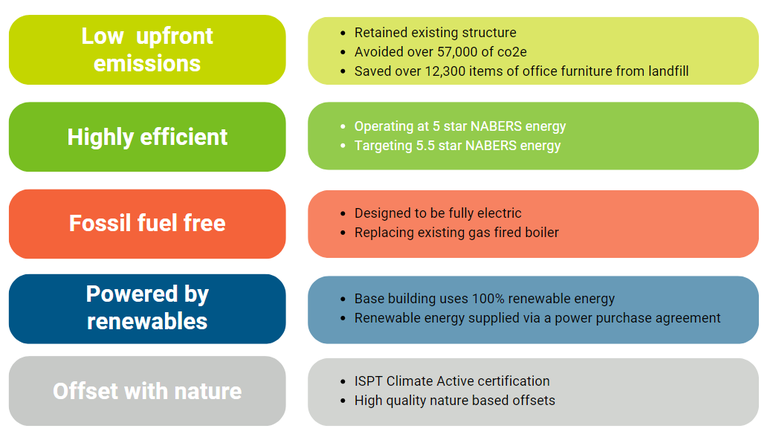The circular way to better futures
28 Aug 2024
ISPT’s purpose is to create better futures. It’s a purpose the property fund manager has successfully brought to life for industry superannuation fund members for over 30 years and one that extends into ISPT’s portfolio of 139 properties across Australia. As a GBCA member of 18 years, ISPT has long supported our work, so we were thrilled to welcome them as the first property company to join us as a circular economy principal partner. We spoke to Steven Peters, Chief Sustainability Officer and Grainne Kearns, Chief Technology Officer, about the partnership and ISPT’s vision for a circular future.
With many working Australians having their retirement savings invested in property through ISPT, and an ongoing commitment to create better futures, reducing the impacts of climate change is a long-term priority for ISPT and its investors.
The built environment has a substantive opportunity to contribute to Australia’s growing circular economy. As part of this partnership, we are working collaboratively with ISPT’s ESG and Innovation teams to use an innovation framework to rapidly explore, design and pilot circular strategies and tactics, inspiring the next generation of sustainable interiors. It’s an ambition Steven says can only come to life if we’re all in it together.
“The GBCA is at the forefront of driving sustainability outcomes across the built environment, and so, there was clear alignment to join the GBCA as a circular economy principal partner. As we worked through ISPT’s vision and roadmap, we recognised that we need to develop our capability and capacity, that we can’t do this on our own, and that we need a fresh approach,” says Steven.
Grainne Kearns, Chief Technology Officer, ISPT, says scalability is crucial as industry continues to adopt a circular approach, “Our ISPT-designed innovation framework unlocks the ability to rapidly translate sustainable design practices and circular economy principles into tactical initiatives that can be rapidly tested and applied across the entire ISPT business. We look forward to actively contributing to the development of GBCA guidelines and case studies with valuable insights and outcomes.”
Taryn Cornell, Senior manager strategy and development at GBCA agrees and says to spark industry-wide action towards a circular economy, a new way forward is necessary, “This partnership is a chance to work and learn from each other. There is abundant potential to reduce waste and embodied carbon in existing buildings, refurbishments and fitouts. ISPT is showing how this can be done today.”
Enter 500 Bourke Street, Melbourne
500 Bourke Street is proof of the time, money and carbon that can be saved when circularity and repurposing overrides demolition. ISPT invested $160M into the transformation, which honoured the 40-year-old building while protecting the resources within.
Steven says ISPT recognises that the building sector contributes significant amounts of waste to landfill annually, that the current way of operating must change, and that the steps towards that change are evident.
“ISPT’s vision is to redefine waste to realise a circular future, together. Our goal is to provide customers with innovative and sustainable facilities, with the aim of reducing our dependency on natural resources; maximising resource recovery; and minimising materials sent to landfill. With a clear roadmap in place, we are confident we can achieve this,” said Steven.

Circular collaboration in action
Our partnership with ISPT recently commenced with a workshop at ISPT’s Sydney headquarters. Attended by GBCA, ISPT, sustainable workstation provider and relocator Egans, and leading architecture and design practice Gray Puksand, the workshop covered how systems and processes in fitouts can support ISPT’s circular targets and enhance scalability.
“What we took away from this day is that circular projects don’t have to sit in isolation. When we work together – from design, to build and end of life – we can create systems and processes that can be applied to other projects, helping us to meet our climate goals faster,” said Taryn.
Steven said the various perspectives shared at the workshop helped to unpack the challenges and opportunities for circularity in the fit-out process.
“Circularity is not an outcome, but a model to apply to the process. The workshop reinforced the importance of establishing networks, that early planning is critical, and that there is an opportunity to design and build out materials that can’t be re-used, re-purposed or re-cycled from the start of a project,” said Steven.
The workshop was an important first step into a new era of collaboration. ISPT will actively contribute to the development of GBCA guides by sharing valuable insights and outcomes from pilot projects, showcasing successful examples of circular fit outs, shaping industry standards, and driving broader adoption of innovative, sustainable practices across the sector. We look forward to sharing more stories and insights from ISPT’s work in the circular space as our partnership evolves.

GBCA is currently developing the Green Star Fitouts rating tool which brings circularity to the core of sustainable interiors of the future. You can find out more about Green Star Fitouts here.